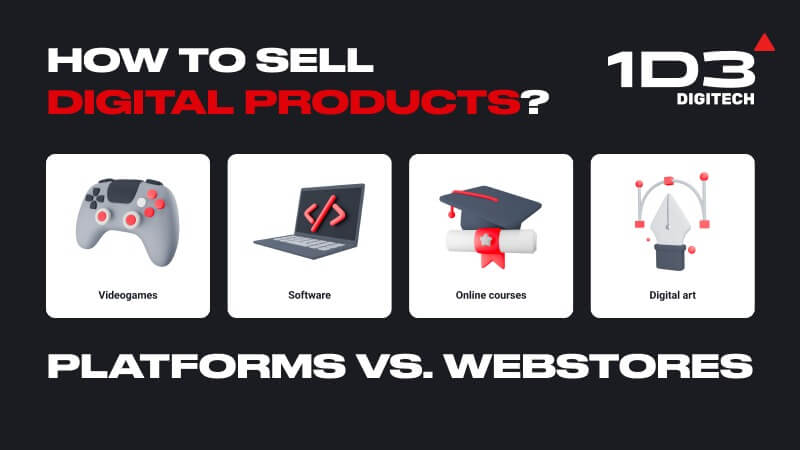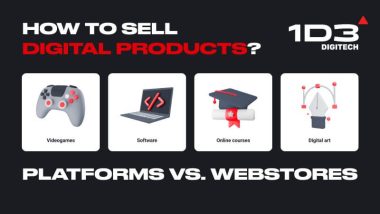Are you planning to sell digital products but unsure whether to use popular platforms or create your own WebStore? This article explores the advantages and disadvantages of both approaches to help you make an informed decision that best suits your business goals.
What Are Digital Products?
Digital products are intangible assets or media that can be sold and distributed repeatedly online without replenishing inventory. They come in various formats, including downloadable files, streaming content, or access to online services. Examples include e-books, software, online courses, music files, and digital art.
SELL DIGITAL PRODUCTS WORLDWIDE
GET IN TOUCH WITH 1D3Key Differences When Doing Business with Digital Products
- No Physical Inventory: Unlike physical goods, digital products don't require storage space or inventory management.
- Instant Delivery: Customers can access their purchases immediately after payment, enhancing customer satisfaction.
- Global Accessibility: Digital products can be sold and delivered anywhere in the world without shipping constraints.
- Scalability: Selling digital products allows for unlimited sales without additional production costs.
- Unique Legal Considerations: Intellectual property rights, digital piracy, and specific sales tax laws are more prominent concerns.
Types of Digital Products
Digital products come in a wide variety, offering countless opportunities for creators to monetize their skills and knowledge. While the possibilities are virtually limitless, we'll focus on some of the most common types that have proven successful in the digital marketplace.
E-books and Written Content
Digital books, guides, and reports that can be read on electronic devices. They are popular due to their convenience and instant access.
Audiobooks
Audio recordings of books or other written materials, catering to audiences who prefer listening over reading.
Online Courses and Workshops
Educational content delivered through video lessons, webinars, or downloadable materials. They can cover a vast array of topics.
Software and Applications
Programs and apps for computers and mobile devices that solve specific problems or provide entertainment.
Digital Art and Music
Creative works like illustrations, photographs, and music tracks that can be used for personal or commercial purposes.
Templates and Graphics
Pre-designed templates for websites, resumes, presentations, or graphic elements for designers.
Videogames
Interactive games available for download or online play, ranging from simple mobile games to complex PC and console titles.
Membership Sites and Subscriptions
Access to exclusive content, communities, or services on a recurring payment model.
While we've highlighted some of the most prevalent digital products, you can explore many more niches and formats based on your expertise and your audience's needs. The digital landscape constantly evolves, opening up new opportunities for innovative products.
It's important to note that certain digital products, like videogames, have unique distribution channels and considerations. Videogame distribution can be more complex due to factors like platform compatibility, licensing, and specialized marketplaces. If you're interested in this area, we have another article that delves deeper into the specifics of distributing videogames.
Why Sell Digital Products?
Selling digital products offers unique opportunities beyond physical goods. Low overhead costs, scalability, passive income potential, and effortless global reach make it an attractive venture.
Low Overhead Costs
- No Manufacturing or Shipping: Eliminates costs associated with producing and delivering physical goods.
- Reduced Risk: Lower initial investment reduces financial risk for creators and entrepreneurs.
Scalability and Passive Income
- Unlimited Sales Potential: Sell the same product repeatedly without additional production costs.
- Automated Sales Processes: Use platforms and tools to automate sales, delivery, and customer management.
Global Reach
- Access to International Markets: Sell to customers worldwide without geographical limitations.
- 24/7 Availability: Online stores operate around the clock, allowing for sales at any time.
By leveraging these advantages, you can build a thriving business in the digital marketplace. Embracing low costs, scalability, and worldwide access sets the stage for sustained success in a competitive landscape.
Where to Sell Digital Products
You can sell your digital products through popular platforms like Gumroad and Etsy, or you can sell them via your WebStore. You can also choose to do both. Each method has its advantages and disadvantages, and understanding these can help you decide the best approach for your business. Let's take a closer look at these options.
Selling Digital Products on Popular Platforms
Popular platforms like Etsy and Gumroad offer a straightforward way to enter the digital marketplace. They are appealing for several reasons:
- Ease of Setup: These platforms require minimal technical knowledge, allowing you to create an account and start listing your products quickly.
- Built-In Traffic: They have an established customer base, providing immediate exposure to potential buyers.
- Trust and Credibility: Well-known platforms are trusted by consumers, which can lead to higher conversion rates.
- Promotional Tools: Many platforms offer features like discount codes, affiliate programs, and advertising options to boost your sales.
However, it's essential to consider the commission fees associated with these platforms, as they can accumulate quickly. To illustrate this point, let's look at our client's case of selling Lightroom presets on Etsy.
Consider the sale of a $20 USD preset bundle to a customer in India by a seller from Germany:
- Listing Fee: $0.20
- Transaction Fee: 6.5% of $20 = $1.30
- Payment Processing Fee: 5% of $20 + $0.30 = $1.00 + $0.30 = $1.30
- Regulatory Operating Fee: 0.29% of $20 = $0.058
- Currency Conversion Fee: 2.5% of $20 = $0.50
Total Fees: $0.20 + $1.30 + $1.30 + $0.058 + $0.50 = $3.38.
After deducting all fees from the $20 sale, the seller is left with $16.62 before tax.
This example highlights how platform fees can significantly reduce your profit margins. Even though platforms like Etsy provide valuable services and access to a large customer base, it's essential to factor in all associated costs when choosing where to sell your digital products.
Additionally, while Etsy collects and remits GST (Sales Tax/VAT) in this particular case, other digital product distribution platforms might not handle tax collection or may only cover specific countries and jurisdictions. This means you could be responsible for calculating, collecting, and remitting taxes, which adds to your administrative burden.
Other common drawbacks of selling on platforms include:
- Increased Competition: Popular platforms are saturated with sellers offering similar products, making it challenging to stand out.
- Limited Branding Control: Customization options are often restricted, hindering your ability to establish a unique brand identity.
- Dependence on Platform Policies: You're subject to the platform's rules and any changes they implement, which can affect your business operations without much notice.
- Restricted Access to Customer Data: Platforms may limit the information you receive about your customers, making it harder to build relationships and market directly to them.
- Risk of Account Suspension: Violations of platform policies, even unintentional ones, can lead to account suspensions or closures, disrupting your sales.
Considering these factors is crucial when deciding whether selling on a platform aligns with your business goals. Weighing the convenience and exposure against the potential downsides will help you choose the most effective sales channel for your digital products.
Selling Digital Products via Your WebStore
Operating your own webstore gives you complete control over your brand and customer experience. By partnering with a Merchant of Record (MoR) like 1D3 DIGITECH, you simplify international sales and tax compliance while maximizing your profits.
This approach allows you to customize your website to reflect your unique brand identity, enhancing customer satisfaction through a personalized shopping journey. With full access to customer data, you can engage in targeted marketing and build stronger relationships, all while adjusting pricing and promotions without external restrictions.
One of the significant advantages of using a Merchant of Record (MoR) is the potential for higher profit margins. Let's take a look at the commission structure in the same scenario of selling a $20 Lightroom preset bundle from Germany to India:
- Distribution Fee with 1D3 DIGITECH: 3% of $20 = $0.60
- International Payment Processing Fee: 3.7% of $20 = $0.74
Total Fees: $0.60 + $0.74 = $1.34
Earnings Before Tax: $20 - $1.34 = $18.66
Another key benefit is automated tax compliance. As a global distributor, 1D3 DIGITECH handles all aspects of tax management on your behalf. This includes calculating the correct tax based on the buyer's location, collecting taxes at checkout, remitting collected taxes to the appropriate tax authorities, and providing compliance documentation for transparency and audits. This seamless process ensures you meet international tax obligations without the hassle of managing them yourself, reducing legal risks and administrative workload.
BUILD YOUR OWN DIGITAL PRODUCT WEBSTORE
GET IN TOUCH WITH 1D3By choosing to sell on your own webstore with a Merchant of Record like 1D3 DIGITECH, you not only increase your profit margins but also eliminate the complexities of international tax management. This approach allows you to focus on creating quality digital products and building strong relationships with your customers, all while confidently navigating the global marketplace.
Conclusions
When it comes to selling your digital products, you have important choices to make. Platforms like Etsy and Gumroad provide an easy entry point with access to a large customer base, but they come with significant fees and limitations that can cut into your profits and restrict your brand identity. Alternatively, operating your own webstore with the assistance of a Merchant of Record like 1D3 DIGITECH allows you to retain more of your earnings, fully control your branding, and simplify international tax compliance.
By carefully weighing the pros and cons of each selling method, you can determine the best approach for your business. Whether you choose to leverage popular platforms, establish your own webstore, or combine both strategies, the key is to align your choice with your business goals and resources.








